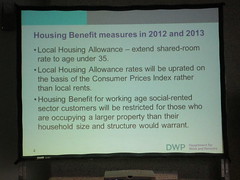
Bill of Benefits (Photo credit: judge_mental)
Anyway here is the extract firstly courtesy of the IFS and Paul Johnson:
The Institute for Fiscal Studies has warned that poor families are set to have their council tax benefits cut due to the Coalition telling councils to cut their benefit bills by 10%. IFS chief Paul Johnson said: “They could decide to take 10% off the current cost of council tax benefit, which means some council tax recipients will be worse off. It’s quite hard to do this without affecting those who receive 100% council tax benefit – the very poorest.” Labour peer Baroness Hollis said the proposals were “deeply unfair”.
Under the present situation these rules apply and provide these guidelines:
Council Tax Benefit: key facts about the current system
Council Tax Benefit (CTB) provides means-tested help to people on a low income who have to pay Council Tax. For working age people there is a limit on savings of £16,000. If you claim means-tested out-of-work benefits (Income Support, Jobseeker’s Allowance and Employment and Support Allowance) you generally receive full assistance, so that you do not pay Council Tax at all. If you are in work or have other income you can still receive CTB but are likely to get less than the full amount, so that your Council Tax bill will be reduced but not eliminated.
A more generous system applies to pensioners. If you claim Pension Credit (guarantee element) there is no limit on the amount of savings you can have and you will normally not pay Council Tax at all. Pensioners with higher incomes can also qualify, even if they do not get Pension Credit, and depending on their circumstances can qualify with an income of £400 a week or more. Around 60% of pensioners are entitled to CTB, though many fail to claim.
Under the new system whereby the amount of benefit is cut by 10% these rules would be drastically amended:
The government’s reform proposals:
The government’s consultation paper makes the following proposals:
Help with Council Tax will be a local authority responsibility and will not become part of Universal Credit (as DWP and some commentators have urged)
The amount provided to local authorities for the new system will be 10% less than current spending on CTB
Support for pensioners will not be affected by this cut in spending and will remain at existing levels with existing rules
Local authorities will be free to establish whatever rules they choose for their schemes for working age people (and will administer the scheme for pensioners using national rules)
Central government will provide a fixed amount of money to local authorities to operate their new schemes. Unlike current arrangements, this central government grant will not be ring-fenced and will not vary according to demand
New local schemes to provide help with paying Council Tax must be in place by April 2013
The consultation paper only directly affects England and separate proposals are likely to be made in Wales and Scotland. However, the 10% spending reduction affects all parts of Great Britain and in the analysis below and in the Annex it is assumed that Wales and Scotland follow suit in protecting the position of pensioners.
Impact of the expenditure cut:
When the new system of local support for Council Tax is introduced in April 2013 the amount provided to local authorities will be reduced by 10% relative to current expenditure on CTB, saving around £480 million a year. However, characterising this as a 10% cut is disingenuous, as pensioners are in effect excluded from the new system. In terms of the population of working age claimants, who are the only ones that can be affected by new rules, the cut is much larger than 10%.
The national picture is shown in the table below. It shows the kinds of people who are currently claiming CTB and how this relates to the savings target of £480 million. Working age people are divided into those who are receiving full CTB, almost all of whom will be claiming claim means-tested out-of-work benefits (Income Support, Jobseeker’s Allowance and Employment and Support Allowance), low earners who are receiving some CTB but have to pay some Council Tax themselves, and other people who are receiving some CTB but are not in work.
Options for meeting the savings target: ‘equal pain’
As shown by the analysis above, local authorities have to make very large savings from working age claimants to meet the government’s savings target. One approach to this would be to impose an ‘equal pain’ rule and reduce all benefit payments by the same proportion (19% on average nationally). However, for those claimants currently getting full CTB this would mean starting to collect Council Tax from a group who currently pay nothing. Moreover, the reason they do not pay anything at the moment is because they qualify for means-tested benefits like Income Support, where by definition the amount of money they have to live on is at ‘safety net’ levels.
Local authorities have some experience of the difficulty of extracting small amounts of money from people living in poverty. The ill-fated Community Charge (or ‘Poll Tax’) of the early 1990s imposed a minimum 20% charge on all citizens, whatever their income or status, so that local authorities had to trace and collect money from everyone living in their locality. While the property base for Council Tax will make the task somewhat easier, that experience shows the difficulty with moving away from full rebates for the poorest. Administering the system is likely to be expensive, with many of the 2 million people now expected to pay likely to opt for weekly or monthly payments, and there is always the possibility of mass non-compliance, as occurred with the Poll Tax.
It may therefore make more sense to look at completely removing entitlement to help with Council Tax from some groups. As well as helping with the administrative problems outlined above, this approach has two advantages. First, it means that particularly vulnerable groups, such as people with disabilities or children, can be protected from the cuts. Second, it is the most effective way of increasing work incentives for particular groups, as it will make them poorer when unemployed and no worse-off when in employment.
Options for meeting the sales target – removing entitlement for some groups!
There are a number of groups who might be candidates for removing from entitlement altogether. For instance, one possibility would be to restrict eligibility for support to tenants, so that owner occupiers were expected to pay the full amount of Council Tax whatever their circumstances. In terms of collection it might be possible to treat unpaid Council Tax as a charge against the value of the property, so that people who could not pay would effectively find arrears added to their mortgage. And low earning owner-occupiers are one of the main groups to benefit from Universal Credit, enjoying help with mortgage payments where none is available currently, creating a further reason for treating this group less favourably. Around 1.5 million CTB claimants are owner-occupiers, and though the majority of these are likely to be pensioners it is likely that removing entitlement from this group would be just about sufficient to meet the savings target.
However, a criterion based on tenure-type would necessarily affect claimants with children or disabilities, two groups who local authorities would hope to protect (and, in the former case, which they have a statutory duty to protect under child poverty legislation). A more attractive route might therefore be to remove from Council Tax support all working age people who do not meet certain criteria, such as having dependent children, living in a household where someone is disabled, being pregnant or a full-time carer. Such conditions would largely mirror the conditions for claiming Income Support and Employment and Support Allowance, so that in effect claimants of Jobseeker’s Allowance would be excluded from the scheme. Nationally around 600,000 people receive full CTB because they are claiming income-based Jobseeker’s Allowance, though around 20% of these have dependent children. Subtracting claimants with children, the likely saving nationally from removing Jobseeker’s Allowance claimants would be around £420 million, and once savings on working non-disabled childless people are included it is likely that the saving target would be met.
The harshness of such an approach cannot be denied. A single unemployed person without children or disabilities currently receives £67.50 a week to live on, and forcing them to pay Council Tax would reduce this to closer to £50 a week. It is difficult to see how they will make ends meet, and collection of Council Tax from this group is likely to be a severe problem. Nevertheless, maintaining support for people with children or disabilities, and avoiding the potential administrative nightmare of imposing ‘equal pain’, will necessarily involve making difficult choices such as this!
Take Our Poll
Related articles
- The poll tax is back from the dead – it’s Cameron localism | Polly Toynbee (guardian.co.uk)
- Poor families lose out in council tax benefit cuts (independent.co.uk)
- “Council Tax Change” (acefinance.wordpress.com)
- Labour warns on council tax hike (standard.co.uk)
Filed under: Ace Benefits News, Ace Finance News, Ace News Desk Tagged: Council Tax, CTB, Housing Benefit, Income Support, Institute for Fiscal Studies, Local government, Pension Credit, Universal Credit
Ed says! How do you feel about the way this government are looking to cut benefits! email me your News and Views to Ace News Desk or tweet your reply on my personal twitter site at #AceNewsServices

No comments:
Post a Comment